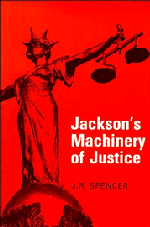Book contents
- Frontmatter
- Contents
- Acknowledgements
- List of figures
- List of tables
- Preface
- Preface to the first edition of ‘The Machinery of Justice in England’
- Abbreviations
- I Historical introduction
- II Civil jurisdiction
- 4 Civil law and criminal law
- 5 County courts
- 6 The High Court
- 7 The mode of trial
- 8 Complaints about the civil courts
- 9 The enforcement of judgments and orders
- 10 The Civil Division of the Court of Appeal and the House of Lords
- 11 The Judicial Committee of the Privy Council
- 12 Arbitration
- III Tribunals
- IV Criminal jurisdiction
- V The personnel of the law
- VI The European dimension
- VII The cost of the law
- VIII Law Reform
- Appendix A The Report of the Civil Justice Review
- Table of Cases cited
- Table of Statutes cited
- Table of Stationery Office publications cited
- Index
4 - Civil law and criminal law
Published online by Cambridge University Press: 10 January 2011
- Frontmatter
- Contents
- Acknowledgements
- List of figures
- List of tables
- Preface
- Preface to the first edition of ‘The Machinery of Justice in England’
- Abbreviations
- I Historical introduction
- II Civil jurisdiction
- 4 Civil law and criminal law
- 5 County courts
- 6 The High Court
- 7 The mode of trial
- 8 Complaints about the civil courts
- 9 The enforcement of judgments and orders
- 10 The Civil Division of the Court of Appeal and the House of Lords
- 11 The Judicial Committee of the Privy Council
- 12 Arbitration
- III Tribunals
- IV Criminal jurisdiction
- V The personnel of the law
- VI The European dimension
- VII The cost of the law
- VIII Law Reform
- Appendix A The Report of the Civil Justice Review
- Table of Cases cited
- Table of Statutes cited
- Table of Stationery Office publications cited
- Index
Summary
The division of the law into civil and criminal gives us the only two categories that are sharply distinguished for the administration of justice, for as a general rule civil cases are dealt with by one hierarchy of courts and criminal cases by another. The word ‘civil’ is unfortunate, since in connection with law it has four meanings. To those in the Armed Forces ‘civil’ generally denotes everything that is not peculiar to the Services; a civil court as contrasted with a court-martial then means a non-service tribunal irrespective of whether it has civil or criminal jurisdiction. To lawyers, the term ‘civil’ is sometimes used to mean the whole law of some particular state in contrast to international law. It may also signify Roman law: this comes from the medieval contrast between Justinian's compilation known as the corpus iuris civilis and ecclesiastical law known as the corpus iuris canonici. In this sense ‘civilian’ means a person learned in Roman law. The fourth sense, in which the word is generally used today, means that part of a country's law that is not criminal. The dichotomy here is really criminal and non-criminal, so that civil cases must be distinguished by settling the boundary of the criminal law.
Any attempt to define a crime in terms of acts or omissions leads to considerable difficulty.
- Type
- Chapter
- Information
- Jackson's Machinery of Justice , pp. 27 - 29Publisher: Cambridge University PressPrint publication year: 1989

